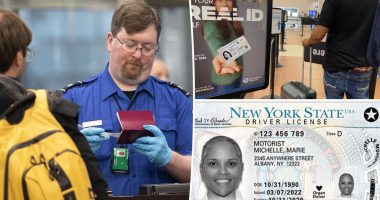A Virginia college student who was paralyzed after being shot in the neck was able to walk to receive his diploma — thanks to a wearable robotic exoskeleton.
Khalil Watson, 25, received a standing ovation as he walked across the Siegel Center at Reynolds Community College on Monday, with the crowd cheering on the tenacious young man.
Video from the Sheltering Arms Institute, which lent Watson the robotic device, captured the moment he stepped out of his wheelchair as the crowd erupted in applause.
With the help of the exoskeleton, along with a pair of canes, Watson successfully made it across the stage to get his diploma and pose for pictures, just like all his fellow classmates.
Watson said the moment meant everything to him because he had missed his high school graduation in 2016, which took place just weeks after he was shot in the neck and suffered a devastating spinal cord injury.
“Anything is possible,” he told NBC 12. “I did this for God, myself, friends, my family. I mean if people only knew how I got to this point.”


Watson said that along with the physical impact of the shooting, the incident took its mental toll on him, forcing him to not only miss his graduation from Highland Springs High School, but also his own prom.
He described feeling like a baby as he had to learn how to eat, speak and breathe properly all over again.
Read Related Also: Pay Increase Announced For Disney College Program Participants!
But despite the grueling therapy, Watson said he was determined to go to college, enrolling at Reynolds to earn a degree in pre-social work.
The college lifestyle presented its own challenges. Mainly, how to get to campus in the downtown Henrico area.


Watson said that he mainly relied on public buses, but whenever he would miss his ride, he was forced to find his one way despite the fact that many of the roads did not always have sidewalks.
“I don’t have a sensible vehicle, so I had to do the best thing I could to get to school,” he said.
During his physical therapy a few years ago, Watson had a chance to test out the Sheltering Arms Institute exoskeleton, which detects the wearer’s slightest movements to allow them to walk and perform other tasks.

Watson spent the last few weeks getting reacquainted with the tech to prepare for his graduation.
With his diploma in hand, Watson plans to enroll at the Virginia Commonwealth University to pursue a bachelor’s degree in social work, ultimately aiming for a master’s.
“I have a passion for helping others, and after going through the things that I have experienced, I feel like I’ll be easy to connect with and understand individuals who have similar or worse situations,” he said.







